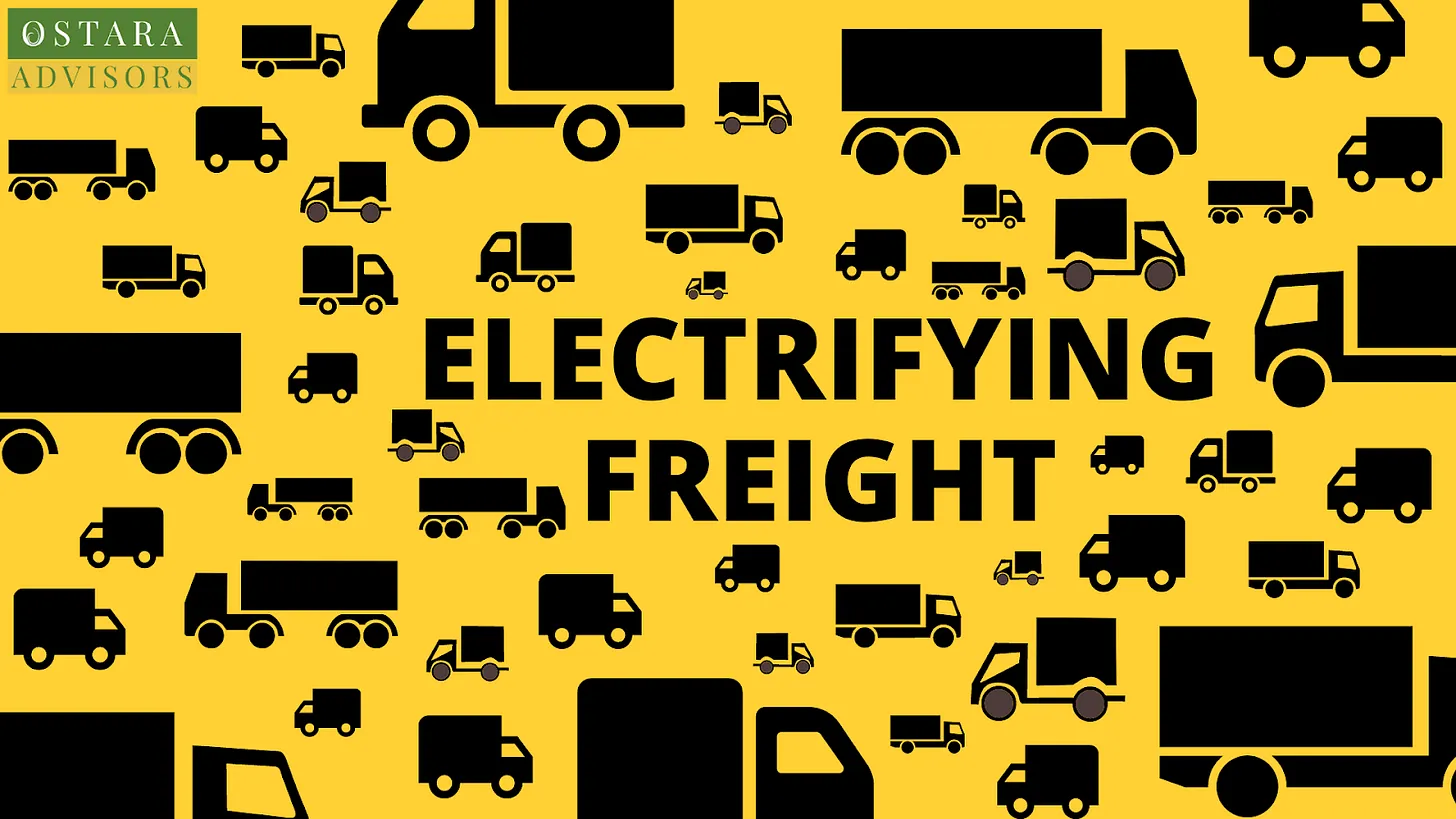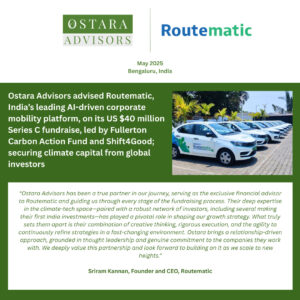India has been the world’s fastest-growing major economy for 4 of the past 5 years. The movement of goods across the country and beyond its borders has created economic opportunities for millions of India’s citizens.
Today, the logistics sector represents 14% of India’s Gross Domestic Product (GDP) and handles ~4 bn tonnes of goods each year, Trucks and other vehicles handle most of the movement of these goods. Railways, coastal and inland waterways, pipelines, and airways account for the rest.
As the transportation sector is responsible for nearly 14% of India’s total greenhouse gas emissions, a transition to clean/electric mobility is an imperative for India’s road freight and logistics industries.
And so, this month, we delve into the various emerging business and operating models for Electrifying Freight.
Freight vehicles in India are classified on the basis of their gross vehicle weight (GVW) as light, medium, and heavy goods vehicles. Among the 14 million freight vehicles on India’s roads today, light goods vehicles (LGVs) dominate the vehicle stock with 56% of the share, followed by heavy goods vehicles (HGVs) contributing 38%.

The Gross Vehicle Weight (GVW) is the weight of the empty vehicle plus that of the maximum payload that the vehicle was designed to carry.
Short haul trucking, or local trucking, involves driving smaller trucks within a 250-km radius of the truck’s origin, to deliver materials to construction sites, retail products from fulfilment centres or food to grocery stores.
Long haul trucking, or “over the road” trucking, involves driving larger trucks with heavier loads across long distances, typically above 400km and typically on highways more than on city roads.
Zero-emission technologies for freight vehicles
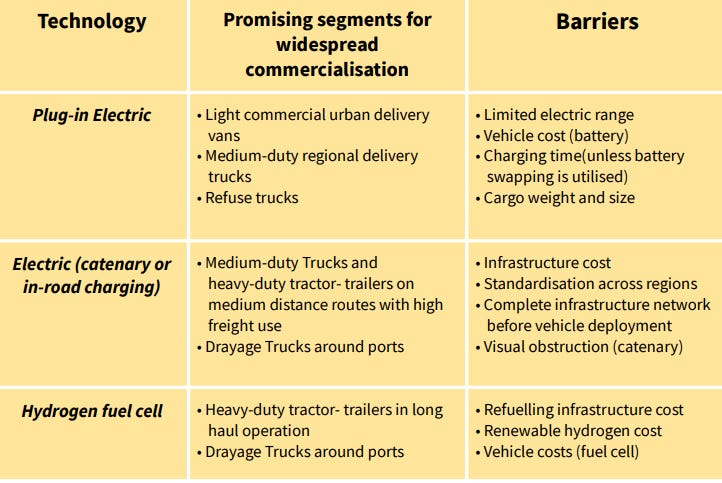
The above table summarises findings for three main technology areas: plug-in battery electric, dynamic electric charging (EVs can be considered to be dynamically charged—via overhead catenary transmission, on-road conductive tracks, or in-road inductive wireless charging), and hydrogen fuel cell vehicles.
- Each technology offers the prospect of lower climate emissions, no tailpipe pollutant emissions, lower fueling cost, greater renewable energy use, and higher on-vehicle energy efficiency.
- Dynamically charged trucks on dedicated e-roads could be implemented on a regional basis in a way that greatly reduces the battery electric truck barriers of battery cost, weight, size, and range.
- Hydrogen fuel cell heavy-duty vehicles could play a key role for low-carbon freight transport in several applications, offering much faster refuelling times compared with electric charging times, along with the potential for much greater range from hydrogen than battery electric trucks with similar specifications.
Limitations of Current Zero-emission Technology for Long-haul Trucking
As technology improves, there are a series of success factors electric utilities must understand as they work to support long-haul trucking customers transitioning to electric truck fleets. ( Powermag, 2021)

Five Charging Options for Electric Trucks – McKinsey Report
These options for medium-duty and heavy-duty electric trucks vary by location, cost, feasibility, and flexibility. The initial costs for each charging solution will include charger hardware, installation, any storage or distributed generation equipment, one-time site construction and grid connection costs, or one-time software development fees. Ongoing operating costs will include maintenance, electricity, demand charges, and labour.
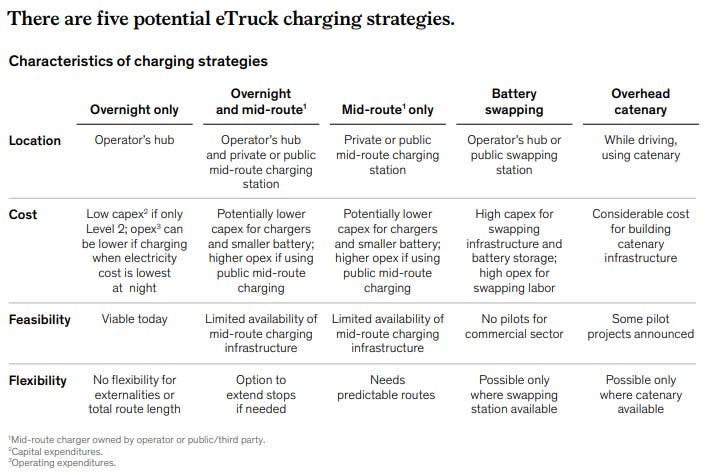
Indian Government Policies to Electrify Freight
The government policy interventions at both the national level and state level support the transition of the freight segment from a fuel based industry to an electrified one. At the national level, the National Electric Mobility Mission Plan (NEMMP) has envisaged electrification of light commercial vehicles (LCV) and has nudged the states to enable both manufacturing and adoption.
Thus, various State-level policies have been formulated to further push the penetration of electric vehicles. A few of these state policies have been shown below.

Freight Vehicle OEMs in India
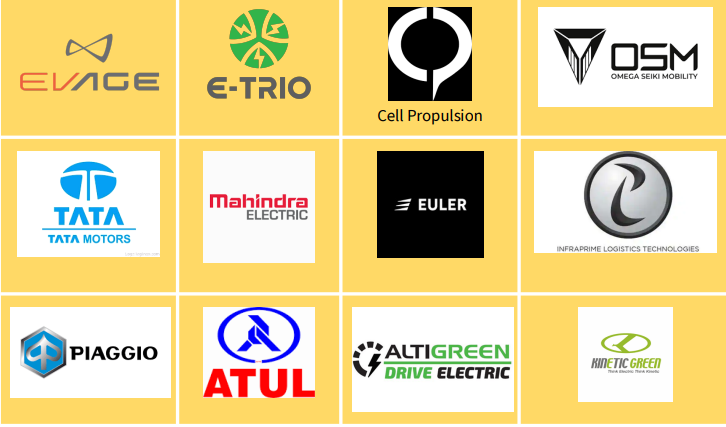
Recent Deals and Developments in India
August 2022: Altigreen and Exponent partner to make 15-minute rapid charging a reality for electric commercial vehicles (eCVs)
August 2022: Hyundai to export heavy-duty hydrogen electric trucks to Germany
July 2022: Tube Investments of India to acquire majority stake in electric truck maker, IPL Tech Electric for Rs 246 crore
April 2022: Magenta ties up with Euler Motors to deploy 1,000 e-cargo vehicles in key cities
Feb 2022: Jet Freight Express deploys electric vehicles in last-mile delivery for e-commerce player

